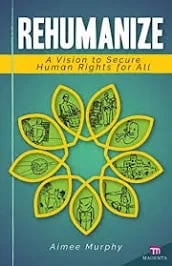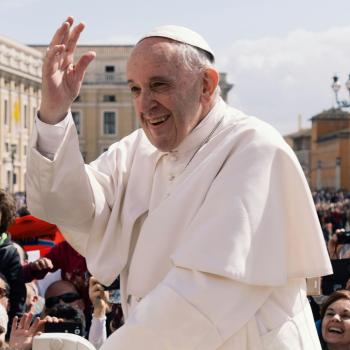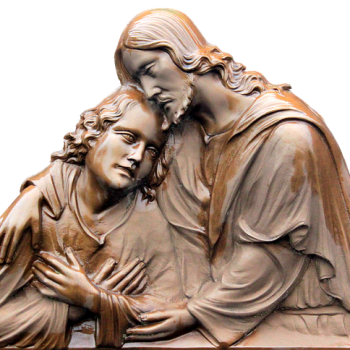Among last year’s political discussions, there were notable references to the Consistent Life Ethic (CLE). As people worked their way to a voting decision, they searched for a rubric that would effectively sort through issues and provide a unifying thread of morality by which to judge them. The result is that more and more people are discovering the Consistent Life Ethic as a standard that fits every life issue.
I have written about the CLE twice before in this blog series. My first article described the CLE as a Catholic ethic: https://www.patheos.com/blogs/musingsfromthepew/2021/09/consistent-life-is-catholic/
The second was a review of Aimee Murphy’s book (from Rehumanize International https://www.rehumanizeintl.org/) that explains the CLE: https://www.patheos.com/blogs/musingsfromthepew/2022/09/a-consistent-life-book/

Another writer, Terry Mattingly, in a column for Religion Unplugged, has also found the Consistent Life message to be an answer to “complex questions in changing times.” https://religionunplugged.com/news/2025/1/29/on-religion-march-for-life-opens-up-complex-questions-in-changing-times Mattingly is a Senior Fellow on Communications and Culture at Saint Constantine College in Houston and writes a Substack newsletter on faith and mass media.
After the March for Life in Washington, D.C. last January, Mattingly pointed out that the main theme at the Vigil Mass (held annually the evening before the March at the Shrine of the Immaculate Conception) was that “the sanctity of human life is an issue that is too complex, and too important, to be discussed in political terms alone.”
The Bishops Preach Consistency
The vigil homilist was Archbishop Joseph Naumann of Kansas City, Kansas, subbing for Bishop Daniel E. Thomas of Toledo, Ohio, who was absent due to a death in his family. Thus, Archbishop Naumann’s sermon included several passages from notes prepared by Thomas. In his column, Mattingly added bold-italics text to references to “seamless garment” issues thus emphasizing the connectedness that is the hallmark of the CLE.
Bishop Thomas wrote: “We encounter Jesus preeminently in the fragile flesh of the defenseless baby in the womb. We encounter Jesus in the fragile flesh of those born with physical and mental disabilities. We encounter the flesh of Jesus in the fragile flesh of the persecuted, the victim, the immigrant poor and the needy. We encounter the flesh of Jesus in the vulnerable elderly, the imprisoned, the addicted, the depressed, the anxious, the fearful, the dying.”
Mattingly notes that Bishop Thomas was referring to “Down syndrome, religious persecution (think Nigeria), prison life (think death penalty), poverty, rising anxiety statistics (think social media) and, of course, immigration reform.”
Applying Consistency

These are all life issues worthy of consideration and activism by pro-life advocates because respect for life applies to every situation in which life is threatened by violence and negative situations. Critics of CLE say that insisting on the interrelatedness of life issues waters down the abortion issue, thus allowing some wishy-washy Christians to ignore abortion in favor of other life issues when it comes to voting and involvement.
On the contrary, it is this interrelatedness that brings the “pro-choice” crowd to an understanding of the need to include abortion among life issues. It is an “if-then” argument: if you are against the death penalty because it takes a life, if you are against war because war takes many lives, then you should be against abortion because it takes a life too and does it just as violently as execution or war.
Notice that Bishop Thomas started his litany of life issues with abortion and used the word “preeminently.” Pope Francis refers to abortion as the “preeminent” life issue as well because no other life issue deals with the number and frequency of deaths that abortion causes. It is our biggest life concern, but it is not the only one if we understand the Christian message about respect for life.
The fact that Bishop Thomas and Archbishop Naumann presented a litany of connected life issues is further proof that the CLE is a Catholic ethic. It should be taught emphatically from Catholic pulpits.
But this consistency chafes some “pro-life” people, Catholic or not. For example: although the Catholic Church opposes the death penalty, many Catholics do not. These people say we should save the innocent unborn, but it is necessary to kill the guilty criminal for the sake of justice and safety. Yet, isn’t the prisoner on death row also a child of God deserving of our love? Deserving of the right to life?

God’s Decisions, God’s Love
Shouldn’t life and death be God’s decisions and not ours? Shouldn’t the time of death be left up to God, even when caring for the elderly or the sick or disabled becomes a “burden”? Not our time, but God’s time; God’s decision, not ours.
It’s amazing how simple finding answers becomes when you let God make the decisions. There’s no ifs, and, or buts; no exceptions, no moral wrangling or excuse making. Just apply the simple rule of “love your neighbor” and recognize that part of “love your neighbor” is to respect every neighbor’s right to live and to ensure the welfare of every neighbor’s existence.
It is not love if you leave your neighbor to suffer with hunger, or illness, or homelessness, or addiction, or persecution. Any of these conditions can kill, so respect for life means love, the kind of love that doesn’t fret over the cost, or the location, or the national origin, or the abilities. Respect for life, if applied consistently, means keeping everyone safe from harm as best we can.
The Good Samaritan story is a perfect example of someone showing respect for life, not just for a precious baby, but also for someone who is injured, perhaps homeless, and certainly friendless at that moment. The Good Samaritan loved this neighbor by saving his life and providing for his needs out of respect for his right to life and well-being.
The Consistent Life Ethic advocates for the protection of the unprotected, no matter the kind of threat to life. It is an ethic of love applied to everyone, at all times, everywhere, in imitation of the way God loves us.
Disclosure: the author is President of the Consistent Life Network, https://www.consistentlifenetwork.org/













